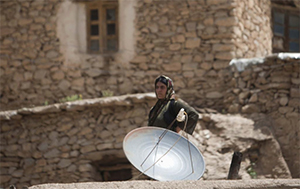 io9 – Mark Strauss: For years, Iran has been blocking foreign television channels. Now, the country’s medical community is convinced that these electronic countermeasures are responsible for a growing number of cancer cases—and their concerns recently received support from a Grand Ayatollah.
io9 – Mark Strauss: For years, Iran has been blocking foreign television channels. Now, the country’s medical community is convinced that these electronic countermeasures are responsible for a growing number of cancer cases—and their concerns recently received support from a Grand Ayatollah.
In Iran, satellite dishes are illegal, yet as many as half the people in the country own them to watch foreign programs, such as singing competitions, music videos, classic films and Persian-language news services produced by the BBC and Voice of America. The Iranian police often raid apartment buildings to find and destroy the contraband equipment. And, government officials rely on jamming technology to scramble incoming transmissions, particularly during times of political unrest.
Now, however, the jamming technology itself is a cause of unrest. According to a report on the Persian Letters Blog, which provides English-language translations of the Iranian media:
While little is known about the precise technology Iran employs to scramble satellite transmissions, Iranian newspaper reports and also some officials— including Massoumeh Ebtekar, a former member of Tehran’s city council and currently vice president— have suggested that the practice could cause health problems for citizens.
“What we know is that these signals have an impact on people’s health and the body’s cells,” Ebtekar was quoted as saying in 2012. “As an immunologist and researcher, I’d say that these signals could be the source of many illnesses.”
And, just yesterday, according to the Mehr News Agency, Iran’s Chief of Internal Medicine reported a rise of 20 to 30 percent in the number of cancer cases in the country, saying that, “By next year, we will have 400,000 cancer patients.” He placed part of the blame on “electronic jamming waves.”
There is no actual evidence of a connection between satellite jamming and cancer. (A World Health Organization official has said that, without knowing the exact strength of the frequencies, it would be impossible to draw any conclusions about health risks.) Nevertheless, in response to public pressure, Iranian Health Minister Hassan Hashemi has set up a committee to investigate the matter.
The issue has the potential to cause a rift in the Iranian government, since, as the Guardian reports, “the elite Revolutionary Guards, close to the supreme leader, Ayatollah Ali Khamenei, and its Basij voluntary militia are particularly worried about people’s unrestricted access to foreign channels.”
And now, there is yet another twist in the debate. Persian Letters Blog reports that Shafaqna, a Shi’ite news agency, recently posed a question to Iran’s Grand Ayatollah Musavi Ardebili about what Islamic law has to say about this issue:
“Given the enemy’s exploitation of satellite channels in order to [push forward] its goals against Islam, [and considering] the interests of the Islamic world and Islamic culture on the one hand, and on the other the jamming of these channels, which increases the risk of neurological disorders, heart arrhythmias and cardiac arrest, death of children and newborns, leukemia, multiple sclerosis, and incurable diseases and the silent death of Muslims and other citizens of Muslim countries—are the transmissions of these permissible under Islamic laws or not and what is the verdict?”
Grand Ayatollah Musavi Ardebili, in a written response to Shafaqna, wrote, “If it is proven that jamming signals cause significant problems such as those mentioned in the question, then their transmission is not permissible.”
In other words, Ardebili states that even if satellite jamming is a useful tool in protecting Islamic values, it is not permissible under Islamic law if it poses a health threat.
